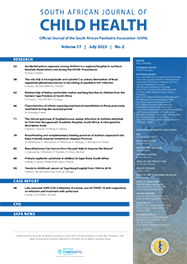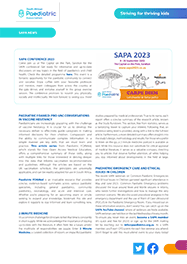Articles

Factors affecting HIV-infected Mothers' ability to adhere to antenatally intended infant feeding choices in Tshwane
Abstract
Patients and methods:The postnatal feeding practices of 222 HIV infected mothers were compared with their prenatal intentions and with those of 53 uninfected mothers.
Results: Ninety-four percent of control mothers were breastfeeding their babies at age 6 weeks, while 69% of study mothers were formula feeding. Of those intending to formula feed prenatally, 25% changed their mind and breastfed, while 50% of 52 women planning to breastfeed switched to formula feeds.
Conclusion: Decision making on infant feeding is dependent on a women’s age, her ability to cope with her HIV status and most importantly her ability to disclose this, starting at the health facility level through to the household level. We show that women are influenced by circumstances within their homes and at the hospital to depart from their original feeding intent.
Authors' affiliations
Joan Nteboheleng Matji, University of Pretoria
Dankwart F Wittenberg, University of Pretoria
Jennifer D Makin, University of Pretoria
Una E MacIntyre, University of Limpopo, MEDUNSA campus
Bridget Jeffrey, University of Pretoria
Brian WC Forsyth, Yale University
Full Text
Keywords
Cite this article
Article History
Date published: 2009-05-27
Article Views
Full text views: 2155

.jpg)



Comments on this article
*Read our policy for posting comments here